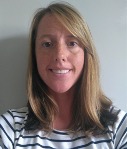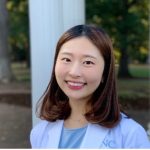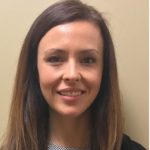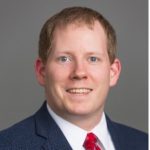August 2021 Vol. 10
Newsletters will share updates about the School and Experiential Programs, recognize our preceptors and students, and provide teaching pearls for preceptors.
Message from the Office of Experiential Programs
The Office of Experiential Programs is delighted to welcome a new team member to our office in the role of Experiential Programs Manager: Jenny Kaselak, BA, MEd.
 Jenny has a wealth of experience with learners and preceptors, and we are fortunate to have her join our team. In her new role with the School, Jenny will be directing student experiential placements, student housing, and financial support services. She will be collaborating with team members in the Office of Experiential Programs for preceptor and faculty onboarding and training. Jenny will serve as the team’s experiential programs management software (CORE/RxPreceptor) superuser.
Jenny has a wealth of experience with learners and preceptors, and we are fortunate to have her join our team. In her new role with the School, Jenny will be directing student experiential placements, student housing, and financial support services. She will be collaborating with team members in the Office of Experiential Programs for preceptor and faculty onboarding and training. Jenny will serve as the team’s experiential programs management software (CORE/RxPreceptor) superuser.
Jenny is originally from the Columbus, Ohio area. She graduated with her bachelor’s degree in psychology and Master of Education in counseling from Ohio University. After spending time as an Academic Advisor and Director of a Student Academic Support program at DeVry University in Columbus, Ohio, she and her husband made the decision to move to the Triangle area nearly 7 years ago. Since then, Chapel Hill has become their home and their family has grown to include 3 boys – Henry (6), Will (4) and Oliver (20 months). For the past 6 years, Jenny worked in the Department of Pediatrics for UNC Healthcare as a Medical Student Coordinator and most recently as the Division Administrator for Pediatric Gastroenterology.
During her career, Jenny has worked with medical students, residents, and fellows, as well as clinical sites and preceptors for UNC School of Medicine. She is excited to join the UNC Eshelman School of Pharmacy and begin a new chapter of working with pharmacy students, preceptors and experiential faculty in the school.
Please join us in welcoming Jenny Kaselak!
COVID Exposure Process
Due to the recent uptick in COVID-19 exposures and symptomatic individuals, students who are experiencing symptoms consistent with COVID-19, have been exposed to COVID-19, or who have tested positive should first contact the Eshelman Care Line (919-813-0481) then Campus Health (919-966-6573). The Office of Curricular and Student Affairs will work with Campus Health and the student to plan for how immersions will be handled.
Student Spotlight
Haley Mun, Class of 2023
 This edition of the newsletter highlights Haley Mun, class of 2023. Haley Mun is recognized for her efforts to provide inclusive patient care. Keep up the great work Haley!
This edition of the newsletter highlights Haley Mun, class of 2023. Haley Mun is recognized for her efforts to provide inclusive patient care. Keep up the great work Haley!
Haley was born in Seoul, South Korea and grew up in Centreville, Virginia since age 11. After graduation, she plans to pursue a career in community pharmacy and help patients live healthier lives. Below, Haley describes her career goals and interests, thoughts about providing culturally responsive care, and pharmacy practice in Korea.
“My career goal will always be able to serve all patients with kindness and compassion and be entrusted for medical knowledge. In terms of my long-term goal, I would like to open an independent pharmacy or work at a community pharmacy in a concentrated Korean population area. Having Korean as my mother language and having received most of my medical care in Korea, I empathize deeply with Korean Americans who feel uncomfortable going to pharmacies in the United States. Since pharmacies in Korea are almost entirely independent with no big chain pharmacies, you can imagine how one may feel out of place walking into a chain pharmacy in America. You can also imagine how nervous they might be especially if they do not speak English. At that moment, seeing someone who looks like them and hearing the language that they speak can provide an instantaneous relief. I would love to provide a place where they could fully open up and express any of their concerns without any barriers.
It is undoubtedly a gift that I’ve been immersed in both Korean and American cultures; not just because I can speak both languages but mainly because it allowed me to be sensitive of different cultures. It is important to understand culture is not a race or a just a region. There is no collective “Asian culture” or “Korean culture.” A culture can remarkably be individualistic and should not be assumed. For example, before starting my independent pharmacy rotation at Moose Pharmacy, I expected to experience “Southern culture.” I did notice a predominantly Caucasian patient population and the polite Southern lingo being used. However, the more I talked to each of the patients, I realized how diverse they were. Some patients had a very strong religious lives while others did not. Some were reluctant to get COVID vaccines while some were only grateful to receive one. These were not things that I could have known before getting to know them and talking to them. On rotations, it is not always easy to have extended conversations with patients due to limited time and space, but I strive to meet every patient as a unique person and not put them into a cultural box that I assume that they would fit in.
A fun fact I want to share about pharmacies in Korea is that many of the non-prescription drugs are still kept behind the counter. A lot of times people would visit the nearest pharmacy and ask the pharmacist for a recommendation on medicine to help with their symptoms. Pharmacist would then pick and suggest a product from behind the counter. This arrangement helps prevent patients from self-medicating with ineffective or possibly harmful agents!”
Preceptor Spotlight
North Carolina Association Pharmacist (NCAP) Awards
Congratulations to preceptors and experiential faculty who were recently recognized as 2021 NCAP award recipients.
Claire Austin, PharmD, CPP -Excellence in Innovation (not pictured)
Matthew Kelm PharmD, MHA-National Community Pharmacists Association Leadership Award, McKesson Leadership Award
Pete Koval, PharmD, BCPS, CPP- Don Blanton Award (not pictured)
Autumn Steen, PharmD, BCACP, CDCES, CPP- Ambulatory Care Pharmacist of the Year
Tyler Vest, PharmD, MS, BCSCP- Distinguished Young Pharmacist Award
Please read more about these honorees and their awards here:
Matthew Kelm PharmD, MHA
 Matthew Kelm is recipient of The National Community Pharmacists Association Leadership Award, sponsored by NCPA and coordinated by the National Alliance of State Pharmacy Associations (NASPA), and the McKesson Leadership Award, sponsored by McKesson. These awards are presented each year to the state pharmacy association’s President-elect. These awards recognize the recipient for their leadership and dedication to the profession.
Matthew Kelm is recipient of The National Community Pharmacists Association Leadership Award, sponsored by NCPA and coordinated by the National Alliance of State Pharmacy Associations (NASPA), and the McKesson Leadership Award, sponsored by McKesson. These awards are presented each year to the state pharmacy association’s President-elect. These awards recognize the recipient for their leadership and dedication to the profession.
Matthew is the Associate Chief Pharmacy Officer for Inpatient Pharmacy Services and Interim Associate Chief Pharmacy Officer for Ambulatory Care Services at Duke University Hospital in Durham, NC. He earned his Doctor of Pharmacy degree from Purdue University and his Masters in Healthcare Administration from University of North Carolina – Chapel Hill. Matthew Kelm has more than 15 years of experience as a pharmacist, pharmacy administrator, academician, author, and researcher. He is also guest lecturer of the Performance Improvement and Operational Efficiency of Health-system Pharmacy course for the UNC Eshelman School of Pharmacy Master of Science in Pharmaceutical Science with a specialization in health-systems pharmacy. He is actively involved in multiple state and national level professional organizations and currently serves as the President-Elect of the Executive Board of the North Carolina Association of Pharmacists.
In his role, Matthew precept students and residents in pharmacy administration. He shared the following about his precepting practices. “When precepting, I want students to gain a realistic perspective on the role the department of pharmacy plays in the larger health system structure of an academic medical center. When on rotation, learners attend meetings both internal and external to the pharmacy department, review management and leadership literature, actively participate in current departmental priorities and develop their skills in data analysis and interpretation. As part of my rotation, we discuss preparation for residency, responsibility for professional engagement, and the value of building your network.”
Autumn Steen, PharmD, BCACP, CDCES, CPP
 Autumn is the recipient of the Ambulatory Care Pharmacist of the Year Award. The Academy Awards are presented to pharmacists with immense moral character, good citizenship, and high professional ideals, who have made significant contributions to their area of practice. These contributions shall have been in the form of sustained exemplary service or an outstanding single achievement.
Autumn is the recipient of the Ambulatory Care Pharmacist of the Year Award. The Academy Awards are presented to pharmacists with immense moral character, good citizenship, and high professional ideals, who have made significant contributions to their area of practice. These contributions shall have been in the form of sustained exemplary service or an outstanding single achievement.
Autumn is a Clinical Pharmacist Practitioner with Mission Diabetes and Weight Management Center. She earned her PharmD from UNC Eshelman School of Pharmacy in 2013 and completed a PGY1 Ambulatory Care Pharmacy Residency with Mission Health and MAHEC in 2014. In her current position, Autumn provides diabetes education in an ADA accredited program, insulin pump and CGM training for children and adults, and transitions of care services for patients discharged on insulin therapy, and medication management for diabetes and related comorbidities.
Autumn serves as a preceptor for UNC Eshelman School of Pharmacy students and PGY1/PGY2 pharmacy residents. Autumn shared the following when asked about her teaching practices. “I enjoy exposing students to individualized and in-depth diabetes education and medication management. Most of my students tell me they have never been exposed to the type of comprehensive care that entails a 60-minute diabetes education visit, and it can be overwhelming to step into the diabetes educator role as an ‘expert’. All of my students spend time reading foundational clinical trials and review articles that offer an in-depth understanding of the pathophysiology and medical management of diabetes so they can feel more prepared when stepping into this role. My students also get the opportunity to teach complicated concepts in a way that those without a medical background would understand. This is often a harder task than students realize, so we do several practice sessions together where I can play the role of the patient and ask questions that I have heard over the years. By the end of the rotation, my students usually tell me they had no idea how much they didn’t know about diabetes to which I reply, “there is still so much more to learn”. I credit my students with keeping me up to date with the latest clinical trials, medications, and practice guidelines and I always learn something new when they do our staff in-services. Precepting makes me a better pharmacist for my patients, and I am grateful I have the opportunity to serve in this role.”
Tyler Vest, PharmD, MS, BCSCP
 Tyler is the recipient of the NCAP Distinguished Young Pharmacist award. This award was created in 1987 to encourage newer pharmacists to become involved in association activities and community service. This prestigious national award recognizes a pharmacist, in the first decade of their career, in each state, for individual excellence, leadership, and outstanding contributions to the profession of pharmacy. The Distinguished Young Pharmacist award is sponsored by Pharmacists Mutual.
Tyler is the recipient of the NCAP Distinguished Young Pharmacist award. This award was created in 1987 to encourage newer pharmacists to become involved in association activities and community service. This prestigious national award recognizes a pharmacist, in the first decade of their career, in each state, for individual excellence, leadership, and outstanding contributions to the profession of pharmacy. The Distinguished Young Pharmacist award is sponsored by Pharmacists Mutual.
Tyler is the Pharmacy Manager of Automation, Medication Distribution, and Controlled Substances at Duke University Hospital in Durham, North Carolina. In this position, he oversees the automated dispensing cabinets, medication delivery and distribution, and controlled substances for the department of pharmacy. Tyler is also an Assistant Professor of Clinical Education at the UNC Eshelman School of Pharmacy. Tyler completed his Pre-Pharmacy Studies at the University of Kentucky, and his Doctor of Pharmacy at the University of Cincinnati James L. Winkle College of Pharmacy. He completed his Master of Science Degree in Pharmaceutical Sciences with a Specialization in Health-System Pharmacy Administration at the UNC Eshelman School of Pharmacy. Tyler completed his PGY1 Pharmacy Practice Residency and PGY2 Health-System Pharmacy Administration Residency Programs at the University of North Carolina Medical Center. His current interest areas are Acute Care Operations, Leadership Development, Oncology, Practice, and Pharmacy Technician Advancement, Pharmacy Practice and Distribution Models, Productivity and Monitoring, and The Medication Use Process. Tyler is actively involved in the profession. On the state level, he is actively involved in the North Carolina Association of Pharmacists (NCAP). On a national level, Tyler is involved in several roles in ASHP and is a member of the Vizient University Health-System Consortium Pharmacy Network Practice Advancement Committee (PPAC).
Tyler serves as a preceptor for UNC Eshelman School of Pharmacy and describes his teaching practices as follows. “Learning occurs by providing the learner the subject matter in the proper environment. This can vary depending on the scope and nature of the content being discussed. I believe that when we teach in the profession of pharmacy, we should include the pertinent literature to the content being taught. The content should be coupled with active discussion to help the learner understand the current scope of the topic, and gaps that are present. The learner understanding of these concepts will help them engage in the direction of topic at hand. I believe an active discussion partnered with the current literature allows learners to grasp the concepts and topics.”
American Society of Health-System Pharmacists (ASHP) Foundation New Practitioner Pharmacist Leadership Development Grant
The Office of Experiential Programs would like to add an additional note of recognition to Tyler Vest, PharmD, BC, BCSCP for being selected by ASHP Foundation Board to receive a $5,000 grant for his research on “Development of an Efficient Process to Identify Practice-Enhancing Publications about the Medication Use Process and Evaluate Use by Pharmacy Leaders.” This grant supports research projects by new practitioner pharmacists focused on leadership competency development. Congratulations Dr. Vest! More information about these grants can be found here.
Pharmacy Advancement Clinical Education Adjunct Faculty Appointments
Congratulations to the following individuals who received or renewed their Assistant Professor of Clinical Education adjunct appointments in January 2021, for sustained involvement in teaching, scholarship, and service to the School and profession.. The School is grateful for their contributions. More information about this biannual process can be found here.
Michael Bitoni, PharmD, BCPS
Clinical Pharmacist- Cardiology, Cone Health; Assistant Professor of Clinical Education UNC Eshelman School of Pharmacy
Jeanette Bouchard, PharmD
Infectious Disease/Stewardship Clinical Pharmacist, WakeMed Health & Hospitals; Assistant Professor of Clinical Education UNC Eshelman School of Pharmacy
Brian Crandell, PharmD, BCPS, CPP
Clinical Pharmacy Specialist- Oncology, UNC Health Care- Hillsborough Campus; Assistant Professor of Clinical Education UNC Eshelman School of Pharmacy
Atalay Fentie, BS Pharmd, RPh, MPharm
Lecturer, Addis Ababa University; Oncology Clinical Pharmacy Service Coordinator, Tikur Anbessa Specialized Hospital; Assistant Professor of Clinical Education UNC Eshelman School of Pharmacy
Nicholas Gazda, PharmD, MS, BCPS, CSP
Assistant Director- Specialty Pharmacy Services, Cone Health Specialty Pharmacy Services; Assistant Professor of Clinical Education UNC Eshelman School of Pharmacy
Amie Howe, PharmD
UNC PGY1 Community Pharmacy Residency Coordinator, Moose Pharmacy, Assistant Professor of Clinical Education UNC Eshelman School of Pharmacy
Alison Ivey, PharmD, BCIDP, CDPS
Clinical Pharmacist Specialist, Infectious Disease, WakeMed Health & Hospitals; Assistant Professor of Clinical Education UNC Eshelman School of Pharmacy
Tasha Michaels, PharmD, BCACP
Director of Clinical Services- Community Pharmacy, Sona Pharmacies (Blue Ridge Pharmacy, Inc.); Assistant Professor of Clinical Education UNC Eshelman School of Pharmacy
Jenelle Montgomery, PharmD, BCACP, CPP
Clinical Pharmacist, Ambulatory Care, Duke Neurology Clinic, Duke Health; Assistant Professor of Clinical Education UNC Eshelman School of Pharmacy
Taryn Murray, PharmD, BCPS
Clinical Pharmacy Specialist, Internal Medicine, Internal Medicine, UNC Health; Assistant Professor of Clinical Education UNC Eshelman School of Pharmacy
Rachel Selinger, PharmD, BCACP, CPP, CDCES
Clinical Pharmacist, UNC Campus Health; Assistant Professor of Clinical Education UNC Eshelman School of Pharmacy
Natalie Young, PharmD, FACVP
Director Realo Veterinary Pharmacy; Assistant Professor of Clinical Education UNC Eshelman School of Pharmacy
Preceptor Pearl
Building a Sense of Community with Your Learner
Charlene Williams, PharmD, BCACP, CDE
Social connections and interactions are fundamental to learning. Below are some tips to foster a sense of community with your learners.
- Share who you are as a person and professional. The more they know about you, the more likely they are to engage with you and the content of your rotation.
- Share you interest in your practice area
- Share your enthusiasm for teaching
- Share your hobbies and interests
- Get to know your learner as an individual and professional
- Determine their professional interests and goals
- Inquire about their areas of strength and areas of growth
- Ask about their hobbies and interest
- Inquire about circumstances that may impact their learning experience
- Create opportunities for social connection (coffee break, lunch, social event invitations, etc.)
- Help them get acquainted with the rest of the team
- Find ways to express cultural humility (an example is entering into situations with curiosity)
- Make your presence known
- If your learner is participating in self-directed learning or engaged with another team member, collaborate with your learner regarding ways to stay connected for questions or check-ins (text, video chat, email, virtual hangouts, etc.)
- Exchange communication preferences with your learner
- Have timely feedback and follow-up discussions on assignments in order to shape learning
Reference:
Darby F, Lang J. “Building Community”. In Small Teaching Online. Jossey Bass. 2019, 75-105.
Preceptor Well-Being Minute
Work-Life Balance
Sarah Gamcsik, Class of 2022
Suzanne Harris, PharmD, BCPP, Director of Well-Being and Resilience
Amidst re-opening, many of us are excited to go to restaurants, travel, visit family, gather with friends, and… get back to work? While some have enjoyed the option to work remotely, others have found it difficult to compartmentalize work-life from home-life. In fact, one study found that since the pandemic, people are working an average of 48.5 minutes more per day (DeFilippis et al, 2020). Pandemic aside, many of us have a habit of staying plugged in after-hours and unintentionally extending our work days. With more time spent working, there leaves less time in the day for routine tasks and self-care. This can lead to stress, anxiety, and ultimately burn-out. So, how and where do we draw the line?
First, let’s give some tips for setting boundaries in the workplace:
- Assess your needs and communicate limits and expectations with your employer and colleagues. Expect pushback and be willing to negotiate.
- Do not take work-related emails or phone calls when out-of-office.
- Practice saying no. At first, this may involve taking time to respond to certain requests.
- Practice mindfulness. If you notice yourself ruminating on work-related tasks at home that tempt you to open your computer, redirect your thoughts to live in the present.
Next, let’s address how to compartmentalize when working remotely:
- Separate work from home, literally. Create a space in your house dedicated for work and set ground rules with other household members to ensure they are not disruptive to your space.
- Keep a regular schedule. Create and maintain a routine that allows you to designate time for work, breaks, meals, and self-care.
- Take breaks. Give yourself a lunch break plus multiple small breaks throughout the day.
- Leave home. If you are comfortable, make sure to get out of the house every now and then.
Sources:
- DeFilippis, Evan, et al. “Collaborating During Coronavirus: The Impact of COVID-19 on the Nature of Work.” Working Papers, July 2020, doi:10.3386/w27612.
- “Working Remotely During COVID-19.” Center for Workplace Mental Health, American Psychiatric Association Foundation, 2021, www.workplacementalhealth.org/employer-resources/working-remotely-during-covid-19.
- Castrillon, Caroline. “10 Ways To Set Healthy Boundaries At Work.” Forbes, Forbes Magazine, 3 July 2020, www.forbes.com/sites/carolinecastrillon/2019/07/18/10-ways-to-set-healthy-boundaries-at-work/?sh=68351ff17497.
Wellness Website
The Wellness website has been refreshed! The Wellness website is filled with terrific resources. On the website, you’ll find several new resources in each of the 8 dimensions of wellness along with immediate resources such as the School’s Eshelman Care Line.
Newsletter Suggestion Box
We would love to hear from you! Please submit your feedback and suggestions for newsletter improvement along with ideas for future content (preceptor spotlight, student spotlight, preceptor pearl, etc.) here.
Upcoming Events and Other Information
CIPhER – Center for Innovative Pharmacy Education & Research and the
Office of Experiential Programs Present . . .
Preceptor Design Lab Series: Practical Solutions for Navigating Challenging Learning Situations
3:00 pm – 4:00 p.m., Thursday, October 7, 2021. Registration deadline for the live/streamed session is Friday October 1st, at 5p (the recording will be available at a later date for those who cannot attend)
Register Here
Office of Experiential Programs Contact Information
Office Leadership:
Nicki Pinelli Reitter, PharmD, MS, FCCP, CDE
Assistant Dean of Experiential Programs
Responsible for leading the Experiential Education Program and for building and sustaining strategic experiential partnerships. The Assistant Dean of Experiential Programs also serves as the lead administrator of the Experiential Education Program and is responsible for experiential practice site and preceptor engagement initiatives with the School.
Abbey Kruse, M.Ed.
Interim Director, Office of Curricular and Student Affairs
Assistant Director, Office of Curricular and Student Affairs – Experiential Programs
Primary contact for student academic, well-being, professionalism, or discrimination/harassment concerns. Provides Eshelman Care Line and COVID exposure oversight.
abbeykruse@unc.edu
Christy Holland, PharmD, BCACP
Director of Experiential Programs
Provides oversight of Immersion and Advanced Immersion experiences and serves as the primary point of contact for guidance regarding experiential policies and procedures. Provides assistance with setting student expectations, structuring learning activities to meet learning experience requirements, and guidance with student evaluations. Interim contact for Compliance needs.
Experiential Placement and Systems Support:
Jenny Kaselak, BA, MEd
Experiential Programs Manager
Directs student experiential placements and scheduling. Contact for AHEC housing and payments and CORE/ELMS RxPreceptor account questions.
Jenny_Kaselak@unc.edu
Student On-boarding and School Requirements:
TBD
Compliance Specialist
Ensures student completion of site-specific onboarding and school requirements (e.g. immunizations, drug screenings, criminal background checks, CPR, HIPAA Training, OSHA Training, TB Status, and other onboarding as required by sites).
Interim contact for compliance needs: esop_compliance@unc.edu
Preceptor Training, Development, and Recognition:
Charlene Williams, PharmD, BCACP, CDE
Director of Preceptor Development
Develops and oversees preceptor onboarding, training, development, and recognition. Point of contact for preceptor training and development needs and preceptor newsletter content.
charlene_williams@unc.edu
Newsletter Content Editor:
Charlene Williams, PharmD, BCACP CDE
Charlene_williams@unc.edu

